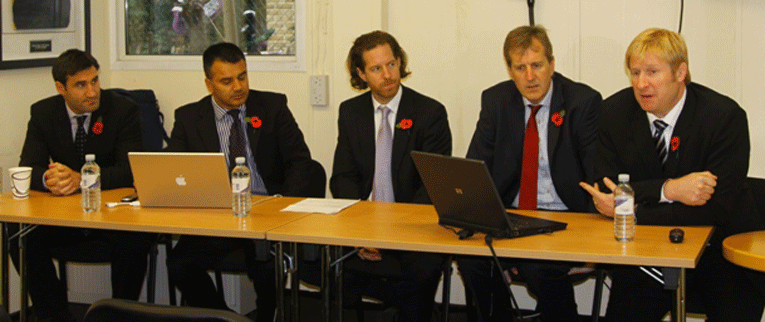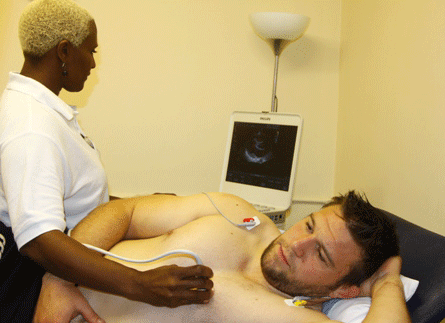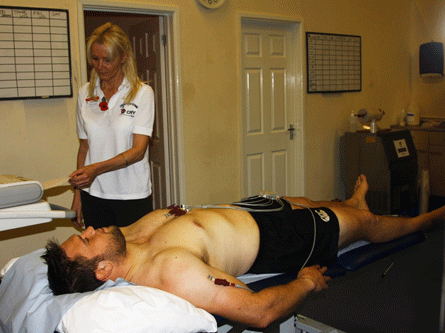26th October 2010
All Aviva Premiership players, Regional Academy players above the age of 16 and England representative team players down to Under 16 level, will be offered testing for cardiac abnormalities in a screening programme announced today at Twyford Avenue, the training base for London Wasps, by Premiership Rugby, the Rugby Football Union and the Rugby Players’ Association.
The testing programme will be carried out in partnership with CRY; Cardiac Risk in the Young, a registered charity raising awareness of undetected cardiac abnormalities in young, apparently healthy individuals.
Abnormalities that remain undetected can lead to death, as in the tragic cases of footballers Marc Vivien Foe, Antonio Puerta and Phil O’Donnell.
Sudden cardiac death has also occurred in the 2004 IRB U19 World cup competition and the 2009 Senior Domestic Rugby League competition.
More recent high profile cases have led to the retirement of Ireland prop Simon Best and Sunderland and Ireland footballer Clive Clarke due to cardiac abnormalities.
Although CRY had been providing a limited screening programme to England representative players since 2004, the expansion of the programme to all elite players over the age of 16 very significantly increases the number of players that screening can be offered to.
Testing sessions have taken place at each of the 12 Aviva Premiership Rugby clubs over the summer, as well as at England representative squad training sessions with 607 players tested to date.
The session at Twyford Avenue was the second of two sessions designed to sweep up any players who have been unable to attend any of the other pre season screening sessions to date.
The screening process involves:
- Personal and family history questionnaire review with an examining cardiologist to detect any cardiovascular condition
- Physical examination by an examining cardiologist
- 12-lead ‘resting’ ECG to detect rhythm, conduction or repolarisation abnormalities
- If clinically indicated – an on-site Echocardiogram
- Note – all ECG’s and Echocardiogarms are reviewed by a CRY cardiologist with expertise in sports cardiology.
CRY co-ordinate all further cardiac investigations, risk assessment, counselling, treatment and follow-up (in conjunction with the player, his GP and club medical staff) as needed via their NHS facilities in Cheshire and SW London while players remain in the elite playing population.
“Further investigations will be referred to Professor Sanjay Sharma at the CRY Centre for Sports Cardiology and inherited Cardiovascular disease at St. George’s Hospital in London and Professor John Somauroo at The Countess of Chester, Cheshire.”
For players over the age of 20, this will be the only occasion on which they will be tested (unless they subsequently develop symptoms suggestive of cardiac disease). However, younger players will be tested every two years until the age of 20 as the heart can continue to grow until that age.
Although the detailed results of the tests are subject to patient-doctor confidentiality, 45 of those players screened had echocardiograms and 12 have been referred for further tests as a result of the screening. No players have been advised to stop playing to date.

The screening programme is consistent with policy recommended by the International Olympic Committee, the International Rugby Board, the American Heart Association and the European Society of Cardiology.
The programme of cardiac screening is one part of a world leading health and welfare programme operating in English rugby. Other key elements of the programme are:
- The England Rugby Injury and Training Audit is now in its 7th season and is the largest continuous study of injury in professional rugby players in the world. The results have guided changes to training methods and supported studies into specific areas of the game, such as the tackle and the scrum.
- Formal yearly audit of a wide range of medical minimum standards referenced to statutory general medical standards (including medical facility standards, emergency equipment standards, qualifications of medical staff, medical record keeping standards, and compliance with:
- Mandation of Pitch Side Immediate Trauma Care Training (PSITCC) for all Premiership Rugby and England pitch-side medical staff attending to players during games and training.
- Mandation of the CogSport psychometric testing programme ensuring all concussed players have their cognition objectively tested and compared to pre-injury levels before a return to play is considered.
- Last season also saw the introduction of compulsory education programmes that address the potential effects of alcohol and illicit drugs on the health of elite players.
- A policy to ensure that all elite players are immunised against Hepatitis B is in final draft and has the support of all parties.
Corin Palmer, Head of Academies and Development at Premiership Rugby said, “We are continually looking at ways of safeguarding the welfare of our players. Cardiac conditions in fit young men are extremely rare, but by testing all the elite players in England, we can identify any individuals at risk and offer advice, treatment and counselling.”
Steve Cox from CRY said, “This important initiative will not only identify those elite rugby players potentially at risk but it will also send a powerful message out to the community about the importance of cardiac screening in all young people. CRY’s screening service is available to those between the age of 14 and 35.
“Any person wanting these tests can visit the CRY website to book an appointment, and they will have the same service as these professional rugby players.”
Dr. Simon Kemp, Head of Sports Medicine at the Rugby Football Union said, “This is another good example of implementation of key injury risk and illness policy across the elite game that was initially recommended by the Professional Game Board Medical Advisory Group. Premiership Rugby, the RFU and the RPA agreed with the group’s recommendation to mitigate the risk of sudden cardiac death across the elite game, supported the policy paper and implemented the policy very successfully this pre-season.”
One of the players being tested at the Twyford Avenue session was London Wasps second row Richard Birkett, who added, “We are very well looked after by the medical staff at London Wasps, but cardiac screening is not something as a squad that we have done before.”
“It makes absolute sense to get checked out. Abnormalities are rare, but I would far rather have more tests and get a problem addressed, than I would have it go undetected with potentially serious consequences.”
“I am delighted to hear the news that all Premiership and Academy players will be screened by CRY. There has been a growing relationship between CRY and the game of Rugby over the years and I hope that this development will eventually lead to all young rugby players in the UK being screened.
The great thing here is that the profile and awareness of the charity will be massively increased by this news.
Our ambitions remain for all young people in this country to be screened for potential unforeseen cardiac problems. This is a major step along the way.”
Simon Halliday, CRY Patron
For more information about CRY’s screening services please click here
A Q&A section about screening and related matters can be found here








